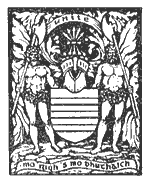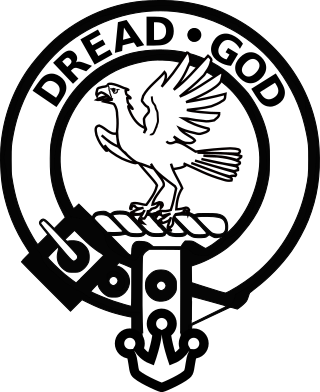Related Research Articles

Sir Ewen Cameron of Lochiel was a Scottish soldier and the 17th Chief of Clan Cameron. He fought as a Cavalier during the Civil War and was one the principal Jacobite leaders during the 1689 Rising. He is regarded as one of the most formidable Scottish clan chiefs of all time. Lord Macaulay praised him as the "Ulysses of the Highlands" and further wrote, "Sir Ewen Cameron of Lochiel was in personal qualities unrivalled among the Celtic Princes. He was a gracious master, a trusty ally, a terrible enemy." An incident demonstrating Lochiel's strength and ferocity in single combat, when he bit out the throat of an enemy, is used by Sir Walter Scott in Lady of the Lake.

Clan Donald, also known as Clan MacDonald, is a Highland Scottish clan and one of the largest Scottish clans. The Lord Lyon King of Arms, the Scottish official with responsibility for regulating heraldry in that country, issuing new grants of coats of arms, and serving as the judge of the Court of the Lord Lyon, recognises under Scottish law the High Chief of Clan Donald. Historically the chiefs of the Clan Donald held the title of Lord of the Isles until 1493 and two of those chiefs also held the title of Earl of Ross until 1476. Queen Mary of Denmark is member of Clan Donald.

Clan Chattan is a unique confederation of Highland clans. The clan is distinctive in highland clan history in that it was acknowledged to be a community or confederation, of twelve separate Scottish clans, who each had their own clan chief recognized under Scottish law, but who were united under and bound to a superior chief of the confederation for mutual solidarity, sustenance and protection in the Middle Ages and early modern period in the Scottish Highlands.

Clan Mackintosh is a Scottish clan from Inverness in the Scottish Highlands. The chiefs of the clan are the Mackintoshes of Mackintosh. Another branch of the clan, the Mackintoshes of Torcastle, are the chiefs of Clan Chattan, a historic confederation of clans.

Clan MacDonell of Glengarry, also known as Clan Ranald of Knoydart & Glengarry is a Scottish clan and is a branch of the larger Clan Donald. The clan takes its name from River Garry where the river Garry runs eastwards through Loch Garry to join the Great Glen about 16 miles (25 km) north of Fort William, Highland. The progenitor of the MacDonells of Glengarry is Reginald, 4th great-grandson of the warrior Somerled. The clan chief is traditionally designated as the "Son of Alexander's son".

Clan Cameron is a West Highland Scottish clan, with one main branch Lochiel, and numerous cadet branches. The Clan Cameron lands are in Lochaber and within their lands lies Ben Nevis which is the highest mountain in the British Isles. The Chief of the clan is customarily referred to as simply "Lochiel".

Clan Davidson is a Highland Scottish clan and a member of the Chattan Confederation.

The Battle of Mulroy was a Scottish clan battle fought in August 1688 in the Lochaber district of Scotland. It was fought between the Clan Mackintosh who were supported by government troops under Kenneth Mackenzie of Suddie against the Clan MacDonald of Keppoch who were supported by the Clan Cameron over disputed lands in the Braes of Lochaber. The battlefield has been inventoried and protected by Historic Scotland under the Scottish Historical Environment Policy of 2009.

Clan MacDonald of Keppoch, also known as Clan MacDonellof Keppoch or Clan Ranald of Lochaber, is a Highland Scottish clan and a branch of Clan Donald. The progenitor of the clan is Alistair Carrach MacDonald, 4th great-grandson of the warrior Somerled. The clan chief is traditionally designated as the "Son of Ranald's son".
Taylor is a sept ("branch") of Clan Cameron, a Scottish clan. Present day members of the Taylor sept hold the Scottish surname Taylor.

Clan MacMillan is a Highland Scottish clan. The Clan was originally located in the Lochaber area of the Scottish Highlands during the 12th century. The clan supported Robert the Bruce during the Wars of Scottish Independence, but later supported the Lord of the Isles in opposition to the Scottish Crown. During the Jacobite rising of 1745 the clan was divided with some supporting the Jacobites and others not taking part in the rebellion.

Clan Matheson is a Highland Scottish clan.

Clan Macfie is a Highlands Scottish Clan.

The Battle of Achnashellach was a Scottish clan battle said to have taken place in the year 1505, in the Scottish Highlands at Achnashellach. It was fought by the Clan Cameron against the Clan Mackay and the Clan Munro.

Donald Cameron, known as Black Taylor of the Axe was a famed warrior of the Scottish Highlands during the reign of Mary, Queen of Scots. Born illegitimate, his father was Ewen Cameron of Lochiel, 14th chief of Clan Cameron, and his mother was the daughter of the chief of Clan MacDougall. Donald Cameron is claimed as the eponymous ancestor of the Taylor sept of Clan Cameron. He is alluded to in the coat of arms of the chief of Clan Cameron, as a likeness of him appears as the supporters holding a Lochaber axe.

The Battle of Bun Garbhain was a Scottish clan battle fought in 1570, in the Scottish Highlands, between the Clan Cameron and the Clan Mackintosh.

The Battle of Lochaber was a battle fought in 1429, in the Scottish Highlands, between the forces of Alexander of Islay, Earl of Ross, Lord of the Isles and chief of Clan Donald against the Royalist army of King James I of Scotland.
Sir William Munro of Foulis was a Scottish Knight and Scottish clan chief of the highland Clan Munro. He is by tradition the 12th Baron of Foulis and 15th overall chief of the clan. However, he is actually only the 5th chief of the Clan Munro who can be proved by contemporary evidence.

Clan Munro is a Highland Scottish clan. Historically the clan was based in Easter Ross in the Scottish Highlands. Traditional origins of the clan give its founder as Donald Munro who came from the north of Ireland and settled in Scotland in the eleventh century, though its true founder may have lived much later. It is also a strong tradition that the Munro chiefs supported Robert the Bruce during the Wars of Scottish Independence. The first proven clan chief on record however is Robert de Munro who died in 1369; his father is mentioned but not named in a number of charters. The clan chiefs originally held land principally at Findon on the Black Isle but exchanged it in 1350 for Estirfowlys. Robert's son Hugh who died in 1425 was the first of the family to be styled "of Foulis", despite which clan genealogies describe him as 9th baron.
The Camerons of Erracht were a minor noble Scottish family and a branch of the Clan Cameron, a Highland Scottish clan. In Scottish Gaelic they are known as the Sliochd Eòghain mhic Eòghain.
References
- ↑ "A History of Clan Cameron". www.clan-cameron.org. Retrieved 2023-06-17.
- ↑ Way, George of Plean; Squire, Romilly of Rubislaw (1994). Collins Scottish Clan & Family Encyclopedia. Glasgow: HarperCollins (for the Standing Council of Scottish Chiefs). pp. 88–89. ISBN 0-00-470547-5.
- ↑ Sinclair, A. Maclean (1908). "The Clan Cameron". The Celtic Review. 5 (17): 70–79. doi:10.2307/30069983. ISSN 1755-6066.
- ↑ Moncreiffe of that Ilk, Iain (1982). The Highland Clans : the dynastic origins, chiefs and background of the clans and of some other families connected with Highland history. Internet Archive. New York, N.Y. : C.N. Potter : Distributed by Crown. ISBN 978-0-517-54659-8.